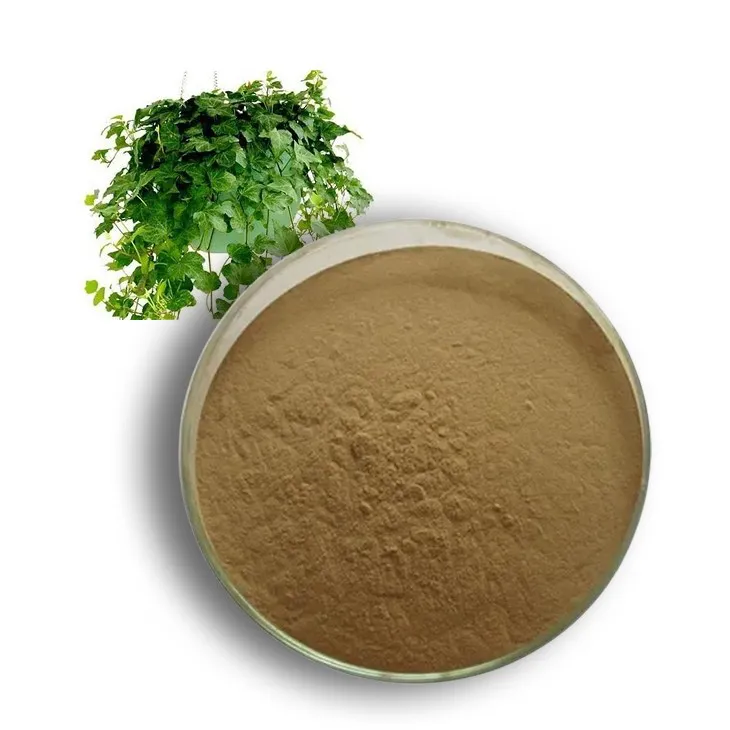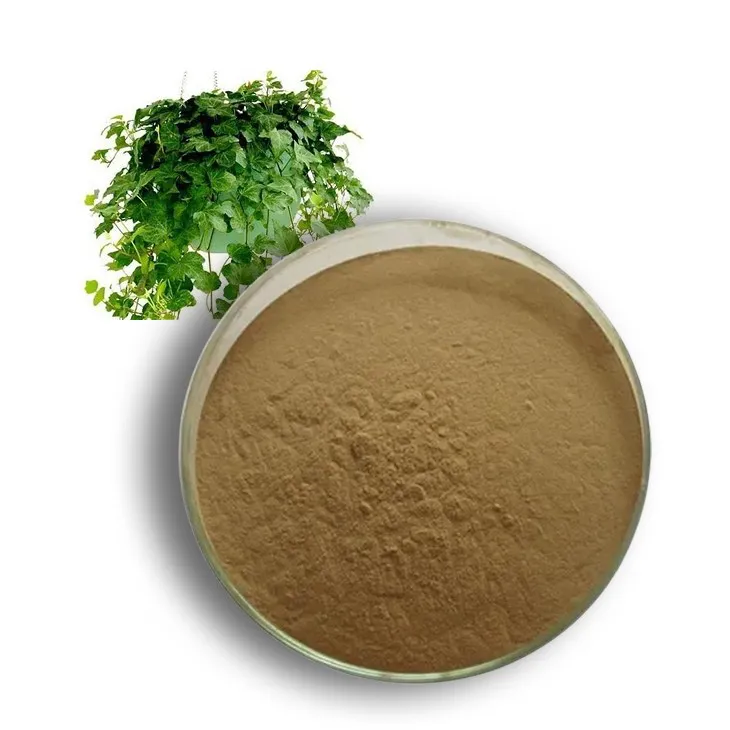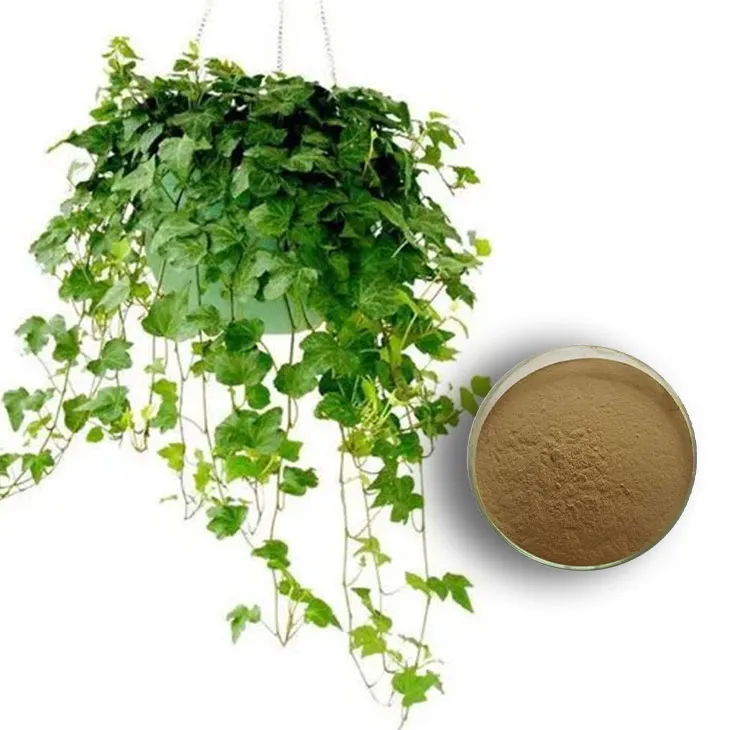- 0086-571-85302990
- sales@greenskybio.com
10 Amazing Health Benefits of Ivy Extract.
2024-11-14

1. Respiratory Health Improvement
Ivy Extract has been widely studied for its positive impact on respiratory health. It contains saponins which are believed to have expectorant and bronchodilatory properties. This means that it can help to loosen mucus in the airways, making it easier to cough up and clear the lungs. For those suffering from conditions such as bronchitis or asthma, Ivy Extract may provide some relief. It can reduce the inflammation in the bronchial tubes, allowing for better air flow. Clinical studies have shown that patients who took Ivy Extract supplements experienced a reduction in cough frequency and severity. Additionally, it may also help to strengthen the respiratory muscles over time, improving overall lung function.

2. Anti - Inflammatory Effects
Inflammation is at the root of many chronic diseases. Ivy extract has strong anti - inflammatory properties due to the presence of various bioactive compounds. These compounds work by inhibiting the production of inflammatory mediators such as cytokines and prostaglandins. When the body is exposed to an injury or infection, these inflammatory mediators are released, which can cause pain, swelling, and redness. By reducing their production, ivy extract can help to alleviate these symptoms. It can be beneficial for conditions like arthritis, where joint inflammation is a major problem. Moreover, it may also play a role in reducing inflammation in the digestive tract, potentially helping with conditions such as inflammatory bowel disease.

3. Antioxidant Activity
Ivy extract is a rich source of antioxidants. Antioxidants are substances that protect the body's cells from damage caused by free radicals. Free radicals are unstable molecules that are produced during normal metabolic processes as well as due to environmental factors such as pollution and radiation. If left unchecked, free radicals can cause oxidative stress, which is linked to various diseases including cancer, heart disease, and neurodegenerative disorders. The antioxidants in ivy extract, such as flavonoids and phenolic acids, scavenge these free radicals, neutralizing their harmful effects. Regular consumption of ivy extract may help to boost the body's antioxidant defenses, reducing the risk of developing these chronic diseases.

4. Skin Health Benefits
4.1 Anti - Aging
The antioxidant properties of ivy extract also extend to the skin. Free radical damage is one of the main causes of premature skin aging, leading to wrinkles, fine lines, and a loss of skin elasticity. By neutralizing free radicals, ivy extract can help to prevent this damage and keep the skin looking youthful. It may also stimulate the production of collagen, a protein that is essential for maintaining skin firmness.4.2 Skin Inflammation
For those with skin conditions such as eczema or psoriasis, which are characterized by inflammation, ivy extract can be beneficial. Its anti - inflammatory properties can help to reduce redness, itching, and irritation on the skin. It can also promote the healing of skin wounds by reducing inflammation and preventing infection.5. Cardiovascular Health Support
Ivy extract may contribute to cardiovascular health in several ways. Firstly, its anti - inflammatory properties can help to reduce inflammation in the blood vessels, which is a risk factor for heart disease. Secondly, it may have a positive effect on blood lipid levels. Some studies suggest that it can help to lower LDL (bad) cholesterol and increase HDL (good) cholesterol. This can help to reduce the build - up of plaque in the arteries, improving blood flow and reducing the risk of heart attacks and strokes. Additionally, ivy extract may also help to regulate blood pressure. By relaxing the blood vessels, it can lead to a reduction in blood pressure, especially in those with mild hypertension.
6. Immune System Boost
A strong immune system is essential for fighting off infections and diseases. Ivy extract can help to enhance the immune system due to its various bioactive compounds. These compounds can stimulate the production of immune cells such as white blood cells, which play a crucial role in the body's defense against pathogens. It may also enhance the function of the immune cells, making them more effective at recognizing and destroying foreign invaders. This can be particularly beneficial during the cold and flu season or for those with weakened immune systems.
7. Anti - Cancer Potential
While more research is needed, there is some evidence to suggest that ivy extract may have anti - cancer properties. The antioxidants in ivy extract can help to protect the body's cells from DNA damage, which is a key step in the development of cancer. Additionally, some of the bioactive compounds in ivy extract may have the ability to inhibit the growth and spread of cancer cells. For example, certain saponins in ivy extract have been shown to induce apoptosis (programmed cell death) in cancer cells in laboratory studies. However, it is important to note that ivy extract should not be considered a substitute for conventional cancer treatment, but rather as a potential complementary therapy.
8. Digestive Health Promotion
8.1 Digestive Enzyme Stimulation
Ivy extract may stimulate the production of digestive enzymes in the body. These enzymes are necessary for breaking down food into smaller molecules that can be absorbed by the body. By increasing the production of digestive enzymes, ivy extract can help to improve digestion and nutrient absorption. This can be especially beneficial for those with digestive problems such as indigestion or malabsorption.8.2 Gut Microbiota Regulation
The gut microbiota plays a crucial role in overall health. Ivy extract may help to regulate the gut microbiota by promoting the growth of beneficial bacteria and inhibiting the growth of harmful bacteria. A balanced gut microbiota is associated with better digestion, a stronger immune system, and reduced risk of various diseases.9. Anti - Diabetic Effects
Some studies have indicated that ivy extract may have anti - diabetic effects. It may help to regulate blood sugar levels in several ways. Firstly, it can improve insulin sensitivity, allowing the body to use insulin more effectively. Insulin is a hormone that is responsible for regulating blood sugar levels. When the body becomes insulin - resistant, blood sugar levels can rise. Ivy extract may help to reverse this insulin resistance. Secondly, it may also slow down the absorption of carbohydrates in the digestive tract, preventing a rapid spike in blood sugar levels after a meal. However, more research is needed to fully understand the mechanisms behind its anti - diabetic effects.
10. Anti - Allergic Properties
Ivy extract has shown potential in alleviating allergic reactions. Allergies occur when the immune system overreacts to a harmless substance, such as pollen or certain foods. The anti - inflammatory properties of ivy extract can help to reduce the inflammation associated with allergic reactions. It may also modulate the immune response, preventing the over - activation of the immune system in response to allergens. Some studies have shown that ivy extract can reduce symptoms such as sneezing, itching, and runny nose in allergy sufferers.
FAQ:
What are the bioactive compounds in ivy extract?
Ivy extract contains compounds such as saponins, flavonoids, and alkaloids. Saponins are known for their various biological activities, including potential anti - inflammatory effects. Flavonoids are antioxidants that can help protect cells from oxidative damage. Alkaloids may also play a role in the health - promoting properties of ivy extract, although more research is needed to fully understand their specific contributions.
How does ivy extract improve respiratory health?
Ivy extract may improve respiratory health in several ways. It has expectorant properties, which can help to loosen and expel mucus from the airways. This can be beneficial for people with conditions such as bronchitis or coughs. Additionally, some of its bioactive compounds may have anti - inflammatory effects in the respiratory tract, reducing swelling and irritation.
Can ivy extract really act as an antioxidant?
Yes, ivy extract can act as an antioxidant. The flavonoids present in ivy extract are antioxidants. Antioxidants work by neutralizing free radicals in the body. Free radicals are unstable molecules that can cause damage to cells and contribute to various diseases. By scavenging these free radicals, ivy extract can help protect cells from oxidative stress and potentially reduce the risk of certain chronic diseases.
Is ivy extract safe for everyone?
Ivy extract may not be safe for everyone. Some people may be allergic to ivy, and in such cases, using ivy extract can cause allergic reactions. Also, pregnant and breastfeeding women should be cautious as there is not enough research to determine its safety during these periods. It is always advisable to consult a healthcare professional before starting any new supplement, including ivy extract.
How should ivy extract be consumed?
Ivy extract is typically consumed in the form of supplements, which can be available as capsules or tablets. However, it is important to follow the recommended dosage instructions provided on the product label. In some cases, ivy extract may also be used in herbal teas, but again, proper dosage and preparation methods should be adhered to.
Related literature
- The Chemical Composition and Biological Activities of Ivy Extract"
- "Ivy Extract: A Review of its Health - Promoting Properties"
- "Antioxidant and Anti - inflammatory Effects of Ivy Extract in vitro and in vivo"
- ▶ Hesperidin
- ▶ Citrus Bioflavonoids
- ▶ Plant Extract
- ▶ lycopene
- ▶ Diosmin
- ▶ Grape seed extract
- ▶ Sea buckthorn Juice Powder
- ▶ Fruit Juice Powder
- ▶ Hops Extract
- ▶ Artichoke Extract
- ▶ Mushroom extract
- ▶ Astaxanthin
- ▶ Green Tea Extract
- ▶ Curcumin
- ▶ Horse Chestnut Extract
- ▶ Other Product
- ▶ Boswellia Serrata Extract
- ▶ Resveratrol
- ▶ Marigold Extract
- ▶ Grape Leaf Extract
- ▶ New Product
- ▶ Aminolevulinic acid
- ▶ Cranberry Extract
- ▶ Red Yeast Rice
- ▶ Red Wine Extract
-
Ginger Extract
2024-11-14
-
Hops Extract
2024-11-14
-
Sophora Flavescens Root Extract
2024-11-14
-
Golden Seal Extract
2024-11-14
-
Red Vine Extract
2024-11-14
-
Curcumin
2024-11-14
-
Echinacea Extract
2024-11-14
-
Apricot Powder
2024-11-14
-
Angelica sinensis extract
2024-11-14
-
Uridine-5'-monophosphate Disodium salt
2024-11-14





















